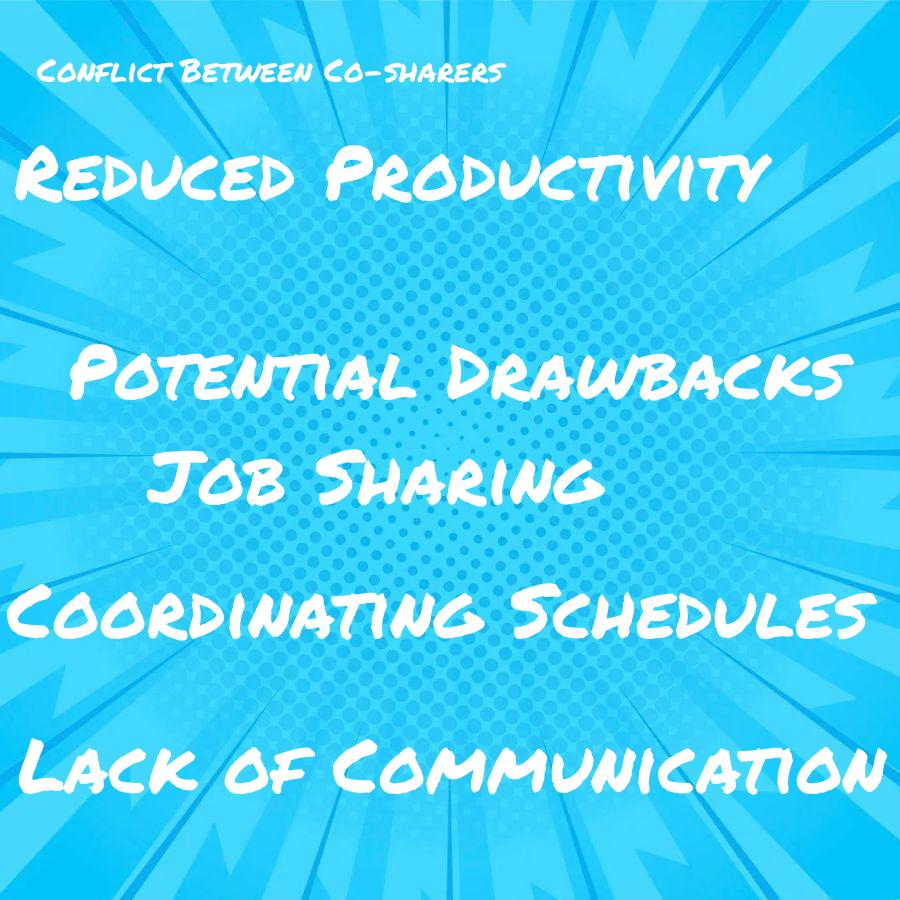Potential drawbacks of job sharing arrangements include decreased productivity due to coordination issues between the two employees, potential conflicts between the two employees, and a lack of continuity in terms of knowledge and experience.
Job sharing is becoming increasingly popular as a way to offer flexible working arrangements for employees. However, there are potential drawbacks that organizations should be aware of before implementing this type of arrangement.
In this blog post, we’ll explore some of the potential drawbacks of job sharing and how they can be addressed. Body: 1.
Challenges in Communication: One of the main challenges with job sharing arrangements is communication between the two employees who are splitting the role. It can be difficult to maintain consistent communication if one employee is not always present in the office or if both employees have different working styles and preferences for communication methods.
To address this issue, it’s important to set up clear guidelines for communicating with each other and ensure that both parties understand their roles and responsibilities within the job-sharing arrangement. 2.
Lack of Continuity: Another potential drawback to job sharing is a lack of continuity in terms of knowledge transfer between shifts or when one employee leaves their role unexpectedly due to illness or other reasons beyond their control. To address this issue, organizations should consider creating processes that allow for easy information transfer between shifts or providing additional training opportunities so that all team members have an understanding of their roles and responsibilities within a job-sharing arrangement.
3. Potential
Lack of Communication

One of the main issues is a lack of communication between job sharers. When two people are responsible for one role, it can be difficult to ensure that each person is aware of all the tasks that need to be completed and any changes in responsibilities or deadlines.
This can lead to confusion and miscommunication, which could have an impact on the quality of work produced. If one job sharer leaves their position unexpectedly, it may take some time before the other job sharer is able to adjust and take on all the duties associated with their role.
Reduced Productivity
This means that when two people share a job, they may not be able to complete tasks as quickly or efficiently as one person working alone. This is because each individual in the job sharing arrangement must take time to adjust to their new role and responsibilities, which can lead to delays in completing projects or tasks.
Communication between the two individuals may be more difficult than if only one person was responsible for the job, leading to further delays and confusion. Since both individuals are splitting their time between other commitments such as family or other jobs, there may be less available hours dedicated solely towards work-related tasks which could also contribute to lower productivity levels overall.
Difficulty in Coordinating Schedules
One of the main drawbacks is difficulty in coordinating schedules. This means that it can be difficult to ensure that two people who are job sharing have compatible work hours and days off.
If one person wants to take a day off, the other person may not be available to cover their shift or vice versa. This could lead to an uneven workload or gaps in coverage which could affect productivity and customer service levels.
If one person needs more time off than the other, it could create tension between them as well as resentment from the employee who has less flexibility in their schedule.
Potential for Conflict Between Co-sharers
This occurs when two people are responsible for the same job duties and have different ideas about how to complete them. For example, one person may prefer to work in the mornings while the other prefers evenings; or one person may want to take on more responsibility than the other.
These differences can lead to disagreements that can cause tension between co-sharers and disrupt productivity. If one of the co-sharers is not pulling their weight or not meeting expectations, it can create resentment from their partner which further contributes to a negative working environment.
Increased Workload for Supervisors/managers
One of the main drawbacks is that supervisors/managers may experience an increased workload when managing job sharers. This is because they must manage two separate individuals who are working part-time in the same role, rather than one full-time employee.
Supervisors/managers must ensure that each job sharer has a clear understanding of their individual responsibilities and tasks, as well as how these relate to the overall goals of the organization. They must also keep track of each job sharer’s progress and performance separately, which can be time consuming and challenging.
Supervisors/managers may need to provide additional support or guidance to help ensure that both job sharers are on track with their work objectives.
Loss of Job Security and Benefits for Employees
One of the main drawbacks is that job sharing arrangements can lead to a loss of job security and benefits for employees. When two people share one full-time position, they may not receive the same level of job security as someone who holds a single full-time position.
This means that if either employee leaves or is terminated from their role, the other employee may also lose their job due to the arrangement no longer being viable. When two people share one full-time position, they may not receive all of the benefits associated with a single full-time role such as health insurance or retirement plans.
This could leave both employees in an uncertain financial situation if something were to happen and they needed access to these benefits.
Related Reading
- How Does Job Sharing Affect Salary and Compensation?
- What Is the Difference Between Job Sharing and Part-time Work?
- How Do Job Sharing Arrangements Impact Team Dynamics and Communication?
- What Are the Benefits of Job Sharing for Employers in Terms of Recruitment and Retention?
- What Are the Ethical Considerations of Job Sharing?